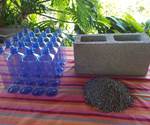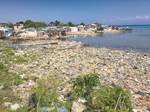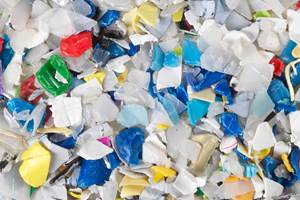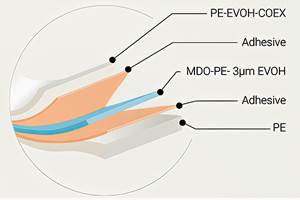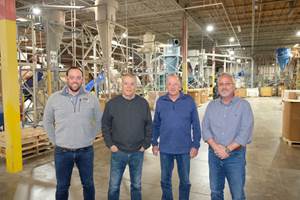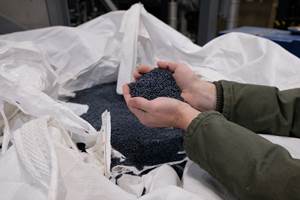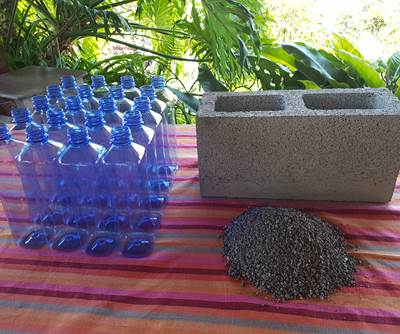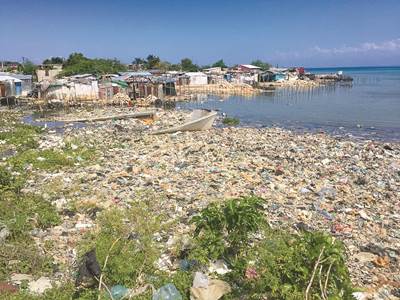Dow is Helping to Build Schools Out of Plastic Waste
Dow is working on several initiatives to solve the global plastic waste issue including helping to build schools out of hard-to-recycle plastic waste in Colombia.
Solving the global plastic waste issue is a hugely daunting task. However, for Dow Chemical, it’s all about working with one community at a time. The company has launched a key initiative that can make sustainable innovation economically viable—and beneficial—for companies and communities worldwide.
In 2016, the Colombian government identified a country-wide deficit of 30,000 schools, which was disproportionately impacting students in poor, rural or isolated areas. At the same time, the country was grappling with how to address the 12 million tons of waste it produces annually, only 17 percent of which is recycled.
Recognizing the potential to help address these issues, Dow partnered with Colombian startup Conceptos Plásticos to launch Aulas Verdes (green classrooms), a unique initiative that builds schools in underserved communities using bricks made of plastic waste.
“At Dow, we are committed to not only advancing the circular economy by developing new applications for post-consumer plastic waste, but also helping to address important social challenges,” Daniella Souza Miranda, Commercial Vice President of Plastics (P&SP) in Latin America, told Plastics Technology.
The Process
Souza said that the construction model implemented by Aulas Verdes leverages both proprietary technologies from Conceptos Plásticos and an array of Dow products that enhance the durability and energy efficiency of both the construction process and the classrooms themselves. One example is Dow’s CoolRoof technology, which effectively reduces 30 percent of CO2 emissions and generates 88 percent and 90 percent more emissivity and reflectance respectively, providing greater safety and comfort to students.
To date, Aulas Verdes has built three schools in Colombia using 12 tons of hard-to-recycle plastic waste. These schools currently serve 600 students, with a potential reach of 3,000 from surrounding communities. “Our plan is to complete 15 schools in total by the end of 2019,” she says.
Through a unique formula and process, Conceptos Plásticos converts hard-to-recycle plastic waste into lego-type blocks that form a constructive system when joined with beams and columns. Souza says that it’s also important to note that 70 percent of each plastic brick is made of hard-to-recycle plastic, such as flexible films, foam to-go containers, plastic cups, straws and lids. In the case of the three schools Aulas Verdes has constructed thus far in Colombia, all 12 tons of hard-to-recycle plastic waste used were recovered from the local environment. A production line of the construction system recovers four thousand tons of plastic annually, equivalent to the reuse of 770 thousand liters of water, 535 thousand kilowatts of energy and 13 thousand tons of CO2.
“At this stage of the Aulas Verdes initiative, the biggest challenge, and opportunity, we’re facing is how to take the successful model that we’ve created with Conceptos Plásticos in Colombia and apply it to other regions of the world struggling with similar plastic waste issues,” Souza Miranda says. “Another challenge has been overcoming difficulties associated with lack of recycling infrastructure in the regions where Aulas Verdes currently operates.”
Expanding the Initiative
Dow plans to continue with Aulas Verdes in Colombia, but also are actively exploring opportunities to replicate this initiative in other parts of Latin America. “We believe this framework can be replicated in underserved communities around the world—particularly in regions that are disproportionately impacted by plastic pollution,” she says.
“Aulas Verdes is one of many ways Dow is helping to drive the circular economy by delivering solutions that close the resource loop in key markets,” Souza Miranda says. “For example, our global plastic roads initiatives have diverted more than 220,000 pounds of waste from landfills for use in modified asphalt in places like Texas in the U.S., Indonesia and Thailand. We also have a variety of ongoing initiatives that aim to collect and convert hard-to-recycle plastic waste into valuable resources, such as fuel or fertilizer, including our collaboration with the Hefty EnergyBag Program.”
Related Content
Looking to Run PCR on a Single Screw? Here’s What to Keep in Mind
Just drop it in and mix it up? Sorry, there’s a lot more to it than that. Here is some of what you need to consider.
Read MoreRecycling Terminology Can Be a Minefield, So We Should Tread Lightly
Loose propagation of terms like “recyclable” and “compostable” has already brought down government regulations on labeling. The plastics and packaging industries should take that to heart with other recycle-related language. Like “monomaterial” for example.
Read MoreEvolving Opportunities for Ambitious Plastics Recycler
St. Joseph Plastics grew from a simple grinding operation and now pursues growing markets in recycled PP, food-grade recycled materials, and customized post-industrial and post-consumer compounds.
Read MoreNew Facility Refreshes Post-Consumer PP by Washing Out Additives, Contaminants
PureCycle prepares to scale up its novel solvent recycling approach as new facility nears completion.
Read MoreRead Next
Costa Rican Startup Makes Cement Blocks with Recycled Ocean-Bound Plastic
This new aggregate—consisting of 80% waste plastic and 20% organic additive—is designed to mix with cement.
Read MoreTrash as Value: Turning Ocean Waste Into Viable Products
So-called “ocean plastics” is a global problem, but a wide range of companies across the entire supply chain have put in the time, money and R&D efforts necessary to make capturing and converting the material into a sustainable business. But demand must follow.
Read MoreLead the Conversation, Change the Conversation
Coverage of single-use plastics can be both misleading and demoralizing. Here are 10 tips for changing the perception of the plastics industry at your company and in your community.
Read More

